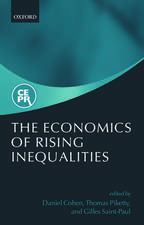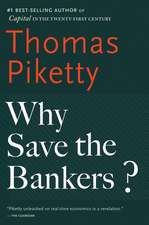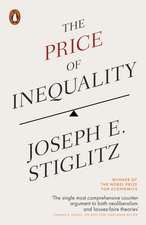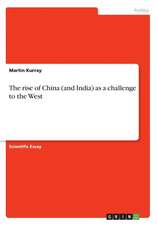Chronicles: On Our Troubled Times
Autor Thomas Pikettyen Limba Engleză Paperback – 24 mai 2017
With the same powerful evidence, and range of reference, as his global bestsellerCapital in the Twenty-First Century -and in columns of 700 words, rather than 700 pages -Chroniclessets out Thomas Piketty's analysis of the financial crisis, what has happened since and where we should go from here.
Tackling a wider range of subjects than inCapital, from productivity in Britain to Barack Obama, it comprises the very best of his writing forLiberationfrom the past ten years. Now, translated into English for the first time, it will further cement Piketty's reputation as the world's leading thinker today.
Preț: 56.96 lei
Preț vechi: 68.90 lei
-17% Nou
Puncte Express: 85
Preț estimativ în valută:
10.90€ • 11.85$ • 9.16£
10.90€ • 11.85$ • 9.16£
Carte disponibilă
Livrare economică 03-09 aprilie
Livrare express 15-21 martie pentru 28.45 lei
Preluare comenzi: 021 569.72.76
Specificații
ISBN-13: 9780241307205
ISBN-10: 0241307201
Pagini: 192
Dimensiuni: 133 x 199 x 12 mm
Greutate: 0.16 kg
Editura: Penguin Books
Colecția Penguin
Locul publicării:London, United Kingdom
ISBN-10: 0241307201
Pagini: 192
Dimensiuni: 133 x 199 x 12 mm
Greutate: 0.16 kg
Editura: Penguin Books
Colecția Penguin
Locul publicării:London, United Kingdom
Notă biografică
Thomas
Pikettyis
Professor
of
Economics
at
the
Paris
School
of
Economics
and
Centennial
Professor
at
the
LSE.
His
bookCapital
in
the
Twenty-First
Century,
which
argued
that
when
the
rate
of
return
on
capital
exceeds
the
rate
of
economic
growth,
the
resulting
unequal
distribution
of
wealth
causes
instability,
hasglobal
sales
so
far
of
more
than
2m
copies.
Recenzii
Piketty
fans
will
be
fascinated.
.
.
He
explains
economic
concepts
to
the
lay
reader
with
the
kind
of
clarity
that
comes
from
a
deep
understanding
of
the
topic
Amazing, inspiring, forward-thinking, and pragmatic.There is a pattern forming -- Marx, Keynes, Piketty. As our world changes the surest explanations and most practical solutions change in turn
The questions explored inthese brilliant essays cut to the heartof our failing economic and democratic systems. If you have been influenced by Piketty's landmark work on inequality,make sure to read this next.
Coming on the heels of his masterwork,Capital in the 21st Century, one might expect this to be the lesser contribution. In fact,Piketty unleashed on real-time economics is a revelation: he is lucid and persuasive- all the more so for beingproved right about most of the events he is responding to, even though the full facts only came out later ... For an economist, Pikettydraws on a vast and unusual store of honesty and emotional intelligence
Well-written and accessible.He ranges widely, to Brazil, Hong Kong, South Africa and Japan. His take, as you would expect, is solidly left-wing but he does not bludgeon.Is this a collection worth buying? For those who did not get enough of him in Capital... yes
Piketty has transformed our economic discourse. We'll never talk about wealth and inequality the same way we used to
The perfect accoutrement for a Bernie Sanders rally.It's easier to carry through a crowd than the economist's 685-page best-seller of two years ago,Capital in the Twenty-First Century
Thomas Piketty depresses as much as inspires ...Beyond the pleasure of hearing his thoughts, there is a fascination in watching his instant response to events
Piketty is back... as withCapital,Piketty remains quietly optimistic'
How one economist tried to make sense of a rapidly changing world ....accessible, direct, universally applicable
Easy to follow for readers without much knowledge of economics, especially when [Piketty] picks apart topics that defy classical economic logic; in this he resembles Paul Krugman, who similarly writes clearly on complex topics ...Helps make sense of recent financial history
Piketty,the French Paul Krugman, has an extraordinary knack for translating the complexities of central bank finance, tax policy, regulation, and macroeconomics intolucid, down-to-earth language enriched by shrewd historical and cultural insights. This is a compelling challenge to economic orthodoxy
The most important work of political economy to be published in decades
The author, an inequality expert, is distinguished. The work is acclaimed. The book's empirical detail is already the stuff of legend
Piketty's treatment of inequality isperfectly matched to its moment... [He] has emerged asa rock star of the policy-intellectual world... His work richly deserves all the attention it is receiving
This small collectionshows Piketty's mastery of a much wider repertoire of political and economic topics...Whether you agree with his views or not, you can't deny his ability to argue and persuade and dazzle his readers. It'sa must-read
Most enjoyable... Genuinely informative and filled with new ideas
Chroniclesis essential reading on why it is important for regulation to stay ahead of markets, as exemplified by the 2008 crisis that still has wounds festering across the world economy
Amazing, inspiring, forward-thinking, and pragmatic.There is a pattern forming -- Marx, Keynes, Piketty. As our world changes the surest explanations and most practical solutions change in turn
The questions explored inthese brilliant essays cut to the heartof our failing economic and democratic systems. If you have been influenced by Piketty's landmark work on inequality,make sure to read this next.
Coming on the heels of his masterwork,Capital in the 21st Century, one might expect this to be the lesser contribution. In fact,Piketty unleashed on real-time economics is a revelation: he is lucid and persuasive- all the more so for beingproved right about most of the events he is responding to, even though the full facts only came out later ... For an economist, Pikettydraws on a vast and unusual store of honesty and emotional intelligence
Well-written and accessible.He ranges widely, to Brazil, Hong Kong, South Africa and Japan. His take, as you would expect, is solidly left-wing but he does not bludgeon.Is this a collection worth buying? For those who did not get enough of him in Capital... yes
Piketty has transformed our economic discourse. We'll never talk about wealth and inequality the same way we used to
The perfect accoutrement for a Bernie Sanders rally.It's easier to carry through a crowd than the economist's 685-page best-seller of two years ago,Capital in the Twenty-First Century
Thomas Piketty depresses as much as inspires ...Beyond the pleasure of hearing his thoughts, there is a fascination in watching his instant response to events
Piketty is back... as withCapital,Piketty remains quietly optimistic'
How one economist tried to make sense of a rapidly changing world ....accessible, direct, universally applicable
Easy to follow for readers without much knowledge of economics, especially when [Piketty] picks apart topics that defy classical economic logic; in this he resembles Paul Krugman, who similarly writes clearly on complex topics ...Helps make sense of recent financial history
Piketty,the French Paul Krugman, has an extraordinary knack for translating the complexities of central bank finance, tax policy, regulation, and macroeconomics intolucid, down-to-earth language enriched by shrewd historical and cultural insights. This is a compelling challenge to economic orthodoxy
The most important work of political economy to be published in decades
The author, an inequality expert, is distinguished. The work is acclaimed. The book's empirical detail is already the stuff of legend
Piketty's treatment of inequality isperfectly matched to its moment... [He] has emerged asa rock star of the policy-intellectual world... His work richly deserves all the attention it is receiving
This small collectionshows Piketty's mastery of a much wider repertoire of political and economic topics...Whether you agree with his views or not, you can't deny his ability to argue and persuade and dazzle his readers. It'sa must-read
Most enjoyable... Genuinely informative and filled with new ideas
Chroniclesis essential reading on why it is important for regulation to stay ahead of markets, as exemplified by the 2008 crisis that still has wounds festering across the world economy





















